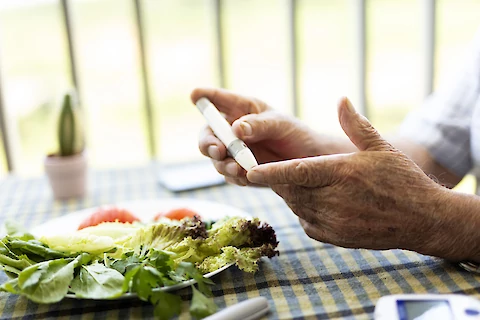
The role of nutrition in managing diabetes is a key determinant of blood sugar levels and overall health in seniors. A balanced and tailored diet can significantly impact blood sugar control, reduce complications, and enhance overall well-being. Caregivers are instrumental in ensuring their loved ones make healthy food choices and stick to a balanced diet. Discover the key nutritional issues for seniors with diabetes, focusing on the value of doable meal planning strategies, foods to eat and avoid, and how caregivers may help their loved ones manage their diabetes.
Diabetes in Older Individuals
Diabetes is a chronic health condition where the body cannot manage blood sugar levels effectively. It can have a significant impact on older adults, increasing the risk of other health complications such as heart disease and stroke. Managing blood sugar levels becomes even more crucial for seniors, considering their susceptibility to these health risks.
The Role of Diet in Managing Diabetes
Diet is crucial in maintaining steady, healthy blood sugar levels, especially for seniors. Regular, balanced meals can help prevent blood sugar spikes and crashes, making it easier to keep diabetes in check. As caregivers, it is essential to understand the importance of assisting seniors to plan their meals.
Foods to Favor for Diabetic Seniors
Healthy, nutrient-dense foods should be the main part of a diabetic senior's diet. These include lean meats, whole grains, leafy vegetables, and fruits low in sugar. Foods high in fiber, such as beans, peas, and lentils, can slow the absorption of sugar into the bloodstream and prevent spikes in blood glucose levels. Omega-3 fatty acids in fish and chia seeds can also contribute to heart health. Remember, the goal is to include these foods in meals to manage blood sugar regularly.
Foods to Avoid for Diabetic Seniors
Certain foods can induce spikes in blood sugar levels; these are best avoided. Foods high in added sugars and unhealthy fats, such as soft drinks, candies, fried foods, and pastries, can cause sudden increases in blood glucose levels. It is also best to limit the consumption of processed foods, as they often contain hidden sugars and unhealthy fats. While eliminating these foods entirely may not be feasible, reducing their consumption can significantly help manage diabetes.
Practical Meal Planning Tips for Diabetic Seniors
Consistency is crucial when it comes to meal planning for seniors with diabetes. Regular meal times help maintain stable blood sugar levels throughout the day. Portion control is also important; using a smaller plate or bowl can be beneficial to keep portion sizes in check naturally. Snacks should not be forgotten; healthy snacks between meals can prevent blood sugar levels from dropping too low.
How Caregivers Can Support Healthy Food Choices
Caregivers can play a vital role in supporting seniors in their journey with diabetes. Creating a supportive environment where healthy choices are encouraged and rewarded can make a big difference. Caregivers can help by encouraging regular meals, introducing variety in the diet, and monitoring blood sugar levels. They can also help seniors understand the impact of their food choices on their blood sugar levels by teaching them to read nutrition labels.
Senior Helpers Victoria Can Help With Meal Planning and Prep
Managing diabetes in seniors is a multifaceted task involving the right balance of diet, regular meals, and a supportive environment. Your role as a caregiver is indispensable. If you live in Victoria, Hallettsville, Cuero, or San Marcos and need help managing diabetes for your senior loved one, reach out to Senior Helpers Victoria. We are committed to providing comprehensive care for seniors, helping them live healthier and happier lives.